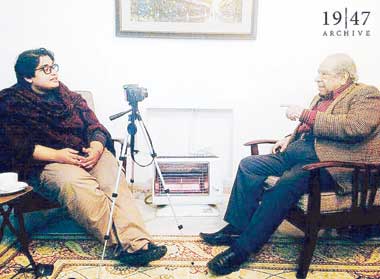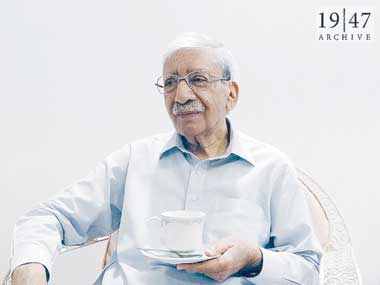An echo from 1947
In keeping the patriotic spirit alive and remembering those who lost their lives and/or livelihoods, Us Magazine (in collaboration with The 1947 Partition Archive) brings you a compilation of stories of partition. 
Ahmed Deen, Gujranwala
Mr. Deen was very young when his family moved to Pakistan. The government announced that Partition was official, and that all Muslims would have to move to Pakistan. He remembers that his village was attacked one day. Six-year-old Mr. Deen was caught in the midst of the violence. He remembers running and falling down and being picked up by one of his father’s uncles. It was the month of either Sawan or Bhadon, he says, and they hid in the sugarcanes where Ahmed Deen remembers going to sleep.
Later, his family joined a kafla heading for Pakistan. This kafla, he remembers, was protected from both sides by tall armed men known to them as “Marhattay.” Ahmed Deen arrived in Kasur, Pakistan on the shoulders of his father’s uncle where he met up with the rest of his family. Ahmed Deen recalls the fear that he felt in leaving everything behind. He remembers a camel that his family had owned. Never has he seen a camel like that one since. This camel was fed special food and could go two days and nights without rest. Before leaving they cut the ropes of all the livestock, so that they would not be burned and killed where they were tied.
Brigadier Izzat Mukhtar Shah, Lahore
Born in Ludhiana, Punjab, in 1933, Brigadier Izzat Mukhtar Shah recalls that a year before Partition, unexpected episodes of shooting and stabbing had started to take over Ludhiana. “One of our relatives was shot in the chest at point-blank range at home by his friend. Luckily, he survived the shot. He still bears the bullet mark on his chest,” he says.
Months before Partition was formally announced, Brig. Shah and his immediate family moved to Lahore permanently. One of his maternal uncles, who was an army officer, had arranged trucks for his families to be picked up from Amritsar and Ludhiana. “Initially, there was a lot of resistance from our families and some of them were shocked to hear that they’d have to leave the cities for good. They said ‘Why would the Hindus and the Sikhs harm us? We’ve been living together for centuries. It’s not possible,’” Brig. Shah recounts hearing his elders say. “Ultimately, after one of the convoys containing some of our family members was attacked at Ludhiana, everyone decided to board the army trucks and move to Lahore,” he recalls.
When Partition was announced Brig. Shah and his family were in Murree and stayed there for another three months. “There was little communal rioting there though I remember seeing parts of Murree burning, like Shalmi in Lahore with the same rage, fear and uncertainty,” he says. His extended family members arrived from Ludhiana and Amritsar few days after Partition, where they were taken to the Walton refugee camp and then relocated to other cities, recounts Brig. Shah.
He resumed his education at the same school in Lahore, and matriculated in 1949, followed by intermediate at the Government College in 1951.After completing his MBBS from King Edward Medical College in 1956, Brig. Shah joined the army as a medical officer in 1957.
After retirement from the army, Brig. Shah went to India and with the exception of his ancestral home in Ludhiana, he visited Amritsar, Delhi, Agra, and Kolkata. “I couldn’t go to Ludhiana at all. I’d heard from one of my friends from school that there is an airport on the ground where our family graveyard used to be, and there are several families living in the haveli but I didn’t have the heart to go there,” he says. Sharing his message, Mr. Shah urges the younger generation to study and work hard, and not to give up on a good education no matter how challenging it gets.
Saleem Murtaza Qureshi, Karachi
Saleem Murtaza Qureshi was born in 1933 in Shimla, Himachal Pradesh. He is the eldest of three brothers. His father was a civilian officer in the army before Partition, while his mother was a homemaker. Mr. Qureshi was raised in Shimla with his brothers. “We’ve seen the winters in Shimla, and the summers too. In the winters sometimes there used to be six feet of snow. There was so much snow that you had to tunnel your way out. Those memories are still vivid,” he says. Mr. Qureshi was fond of photography from a very young age. He used to take pictures with his Kodak box camera that he’d bought for ten rupees from his savings.
In July 1947, Mr. Qureshi’s father opted for the Pakistan during the census, he recalls. “I was a student of St. Edward’s High School at the time. Everything seemed normal. We spent Eid in Shimla. After that, we started hearing stories about what was happening in Punjab and other cities from our neighbors and friends from school,” he says. One day in September, Mr. Qureshi and his family were having lunch at home when their neighbor came rushing to his father in a state of panic. He informed them that a gang was coming to kill them.
Immediately after that, Mr. Qureshi remembers his father telling everyone to start packing and to get ready to leave. “My mother packed up cash, jewellery, and some other valuables in a small bundle. “He had already made plans for us to stay at a hotel in Shimla where arrangements had been made for migrants from the army. We left our house without changing our clothes, and essentially only had what we were wearing and my collection of photographs”. From the hotel at Shimla, Mr. Qureshi and his family were taken to Kalka under army supervision where they were joined by hundreds of families on the train, all from army backgrounds. “We were hoping to go to Lahore directly but couldn’t. From Shimla the train took us to Bombay, the journey took twelve days. During stopovers at some of the platforms, people at the platform gave us food to eat,” he recalls.
After reaching Mumbai, they stayed at the Kalyaan military camp for a few days and then boarded the S.S Vaidisova streamer headed to Karachi. “It was a three-day journey and we were all sea sick. When the ship finally stopped and was being loaded off, I saw people kneeling on the ground and kissing it,” he says.
Interview summary reproduced with explicit permission from The 1947 Partition Archive. For more information, visit www.1947PartitionArchive.org.
Interview of Ahmed Deen conducted by Taha Shaheen, and Fakhra Hassan interviewed Brig. Izzat Shah and Saleem Murtaza Quereshi on behalf of The 1947 Partition Archive.
Photo credits: The 1947 Partition Archive